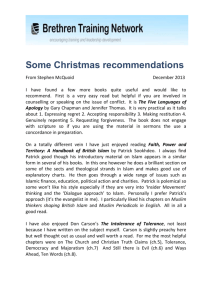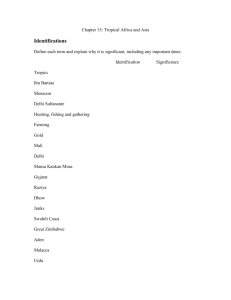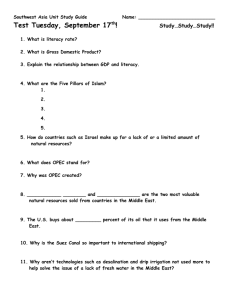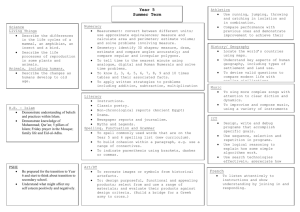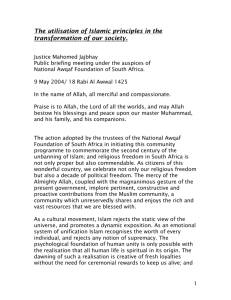Sociology of Islam
advertisement
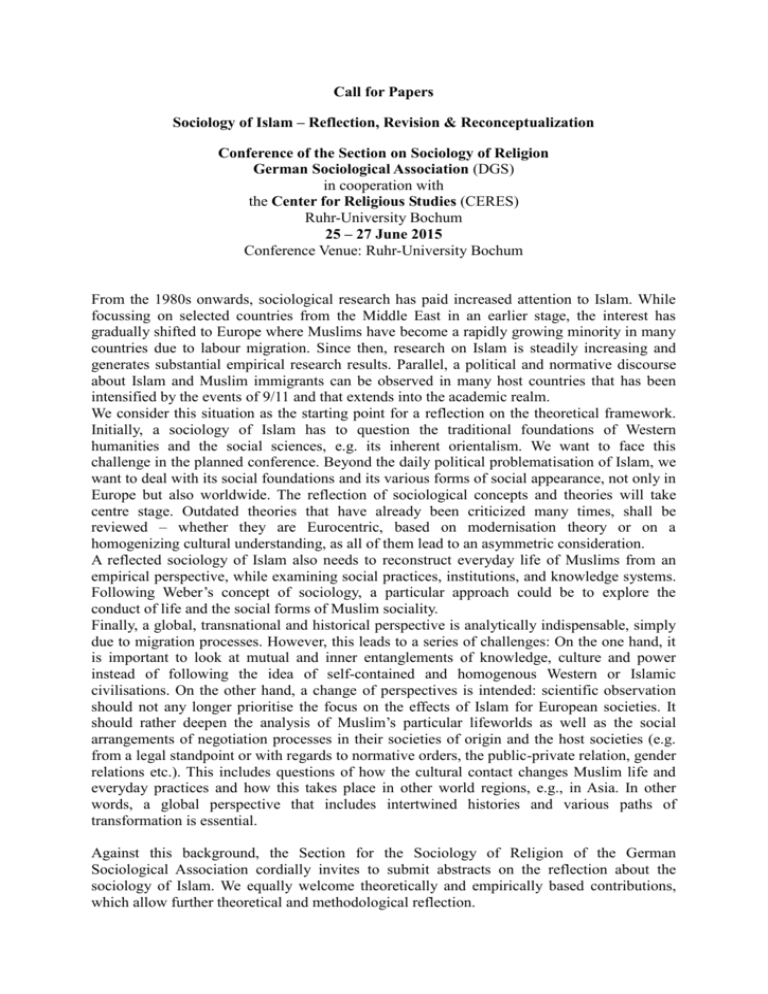
Call for Papers Sociology of Islam – Reflection, Revision & Reconceptualization Conference of the Section on Sociology of Religion German Sociological Association (DGS) in cooperation with the Center for Religious Studies (CERES) Ruhr-University Bochum 25 – 27 June 2015 Conference Venue: Ruhr-University Bochum From the 1980s onwards, sociological research has paid increased attention to Islam. While focussing on selected countries from the Middle East in an earlier stage, the interest has gradually shifted to Europe where Muslims have become a rapidly growing minority in many countries due to labour migration. Since then, research on Islam is steadily increasing and generates substantial empirical research results. Parallel, a political and normative discourse about Islam and Muslim immigrants can be observed in many host countries that has been intensified by the events of 9/11 and that extends into the academic realm. We consider this situation as the starting point for a reflection on the theoretical framework. Initially, a sociology of Islam has to question the traditional foundations of Western humanities and the social sciences, e.g. its inherent orientalism. We want to face this challenge in the planned conference. Beyond the daily political problematisation of Islam, we want to deal with its social foundations and its various forms of social appearance, not only in Europe but also worldwide. The reflection of sociological concepts and theories will take centre stage. Outdated theories that have already been criticized many times, shall be reviewed – whether they are Eurocentric, based on modernisation theory or on a homogenizing cultural understanding, as all of them lead to an asymmetric consideration. A reflected sociology of Islam also needs to reconstruct everyday life of Muslims from an empirical perspective, while examining social practices, institutions, and knowledge systems. Following Weber’s concept of sociology, a particular approach could be to explore the conduct of life and the social forms of Muslim sociality. Finally, a global, transnational and historical perspective is analytically indispensable, simply due to migration processes. However, this leads to a series of challenges: On the one hand, it is important to look at mutual and inner entanglements of knowledge, culture and power instead of following the idea of self-contained and homogenous Western or Islamic civilisations. On the other hand, a change of perspectives is intended: scientific observation should not any longer prioritise the focus on the effects of Islam for European societies. It should rather deepen the analysis of Muslim’s particular lifeworlds as well as the social arrangements of negotiation processes in their societies of origin and the host societies (e.g. from a legal standpoint or with regards to normative orders, the public-private relation, gender relations etc.). This includes questions of how the cultural contact changes Muslim life and everyday practices and how this takes place in other world regions, e.g., in Asia. In other words, a global perspective that includes intertwined histories and various paths of transformation is essential. Against this background, the Section for the Sociology of Religion of the German Sociological Association cordially invites to submit abstracts on the reflection about the sociology of Islam. We equally welcome theoretically and empirically based contributions, which allow further theoretical and methodological reflection. Contributions on the following topics are particularly welcome: Papers on Muslim everyday reality as well as on the social appearance of Islam in European and non-European contexts (concerning religious identity and institutions as well as faith, everyday practices, and conduct of life) Papers which examine how knowledge systems, cultural codes, and institutions of power are shaped by Muslim actors and how they affect them Papers about the patterns of sociality, solidarity, and civility in the countries of origin and their alteration as a result of migration Papers concerning the sphere of political action, especially questions of political integration, religious education and citizenship Papers on Muslim practice in the public and in legislation; especially about the effects of Islam’s public perception from a perspective of visibility and “public observation”. What does this mean for Muslims, for their everyday life, identity processes, practice of religion, right to privacy, and religious freedom, anti-discrimination, and gender equality? Papers examining Islamic based gender orders, their linkage with power and institutions and their renegotiation in the process of migration as well as the impact of Western gender specific stereotypes and ethnic discrimination Confirmed keynote speakers: Bryan Turner and Georg Stauth. Deadline: Please submit abstracts by 30 January 2015 to all organizers. The abstracts should not exceed one page. Organization: Christel Gärtner: cgaertner@uni-muenster.de Levent Tezcan: levent.tezcan@rub.de Heidemarie Winkel: heidemarie.winkel@mailbox.tu-dresden.de



